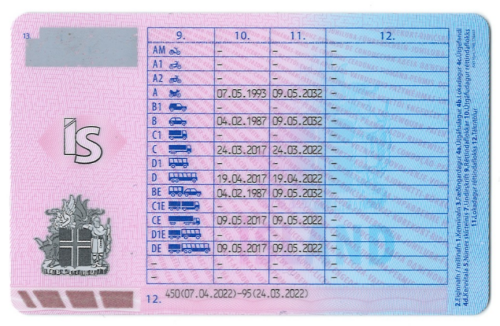- Netökuskóli Ekils
- Ökuréttindi
- Námskeiðin okkar
- Námsgögn
- Verðskrá
The Commercial Driving course
Ekill Driving School offers training for all major driving licenses that fall under advanced driving certifications (commonly known as “meirapróf”). Different types of certifications can be obtained depending on whether the individual aims to drive a taxi, a large flatbed truck, a small delivery truck, a large truck, a small bus with fewer than 16 passengers, or larger buses.
On our driving licenses, these certifications are represented by one or two letters and, in some cases, numbers. Each letter represents a different type of vehicle:

•A - Motorcycles
•B - Vehicles with a maximum total weight of 3,500 kg.
•BFF - Certification to drive passenger/delivery vehicles for up to 8 passengers for commercial purposes.
•C1 - Small trucks and larger vehicles, such as flatbed trucks, with a maximum total weight of 7,500 kg.
•C - Trucks with a total weight exceeding 7,500 kg.
•D1 - Buses for 9 to 16 passengers.
•D - Buses for more than 16 passengers.
•E - Trailers. Additional “E” certification can be added to all the above categories except “A.” Note that the certifications differ depending on whether they are BE, C1E/D1E, or CE/DE. We recommend reading about each certification in detail for further clarification.
Theory for the commercial driving licence
To obtain advanced driving certifications, a theoretical course must be completed before starting practical training. The theoretical training is divided into two parts: a basic course and an advanced course. The basic course lasts two weeks and is mandatory for everyone, regardless of the certification type. The advanced course also lasts two weeks and consists of two subjects called Large Vehicles and Passenger Transport. The specific parts of the advanced course that need to be completed vary depending on the certification type. Detailed information about the requirements for each certification can be found on the corresponding subpage in the menu.
When are the classes held?
The online meetings are held every weekday evening from 5:30 PM to 9:45 PM. Breaks are scheduled between subjects to allow time for meals and stretching.
On site (or in person) classes in the capital area are conducted in sessions according to the published schedule.
How is the teaching conducted?
Online meetings are conducted via an online meeting system, with the exception of one evening where students are required to attend an in-person practical first aid session. This session is typically held in Akureyri and Hafnarfjörður, and students must travel to these locations according to the schedule to complete the theoretical part of the course.
On site teaching takes place at the Menntaskólinn in Kópavogur.
What do I need to participate in the online classes?
We ask our students to use a computer or smart device equipped with a webcam and microphone. We encourage students to actively participate, ask questions, and engage in the sessions whenever the teacher allows.
It is not permitted to attend the course while on the move, such as in a car, walking outside, or engaging in other activities during the class. If a student is found doing so, the teacher may mark them as absent for that session.
Is attendance mandatory for the theoretical classes?
A student is not required to demonstrate attendance to be eligible to take the theoretical exam at Frumherji. However, the student must pass the school exam before the school grants permission to take the theoretical exam at Frumherji.
Practical Training
After the student has passed the so-called ÖR exam at Frumherji and attended all the theoretical classes, practical training can begin. The best approach is to contact us at Ekill Driving School to get information about available slots with a driving instructor.
Practical lessons can also be booked through the Noona system or by clicking the button below.